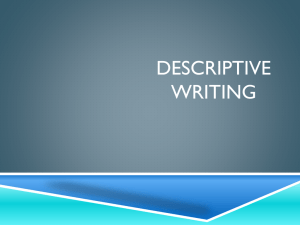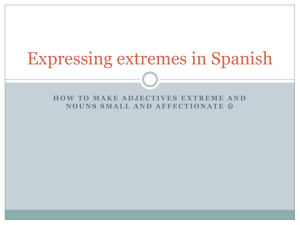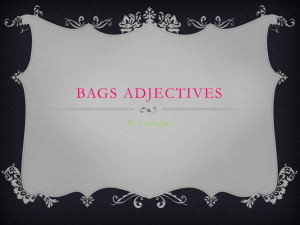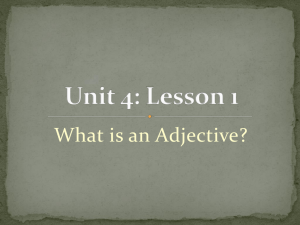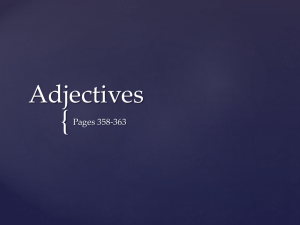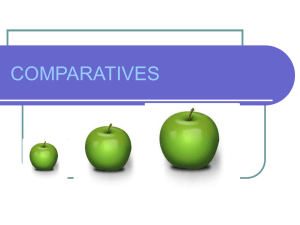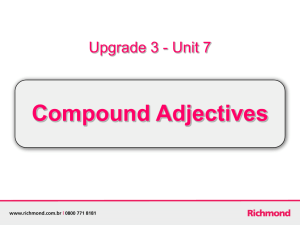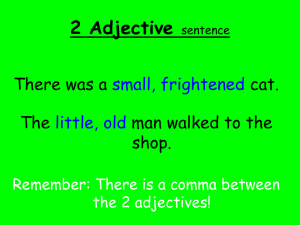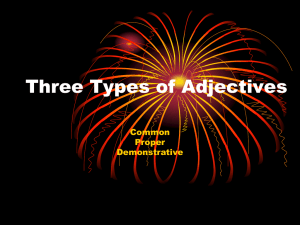Adjectives
advertisement
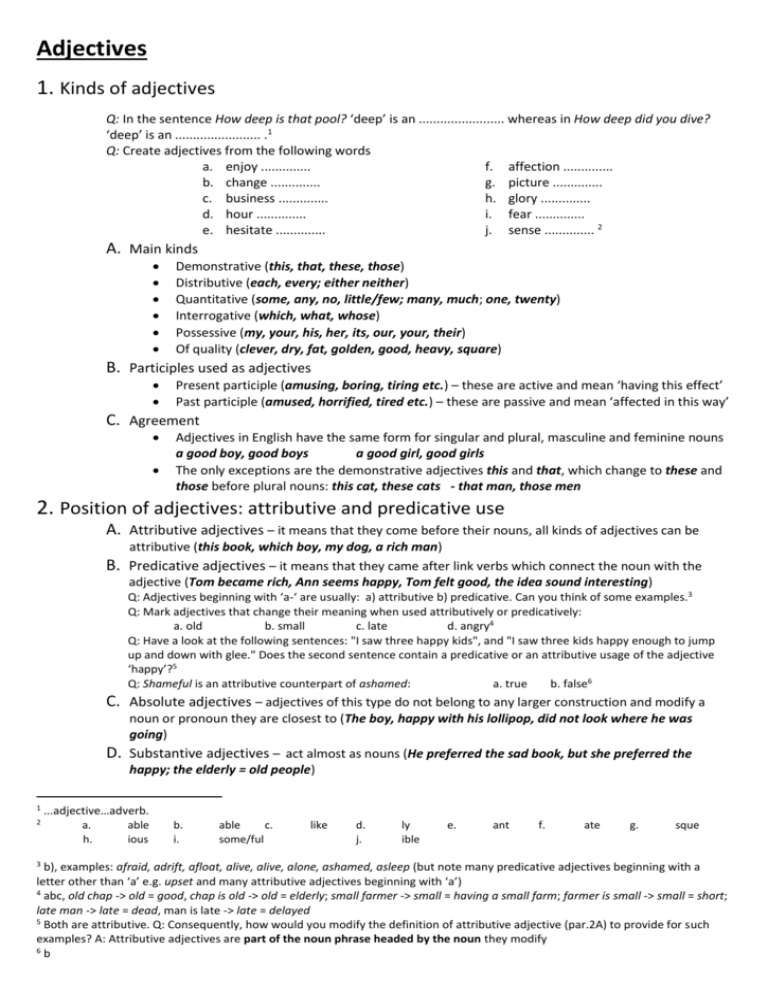
Adjectives 1. Kinds of adjectives Q: In the sentence How deep is that pool? ‘deep’ is an ........................ whereas in How deep did you dive? ‘deep’ is an ........................ .1 Q: Create adjectives from the following words a. enjoy .............. f. affection .............. b. change .............. g. picture .............. c. business .............. h. glory .............. d. hour .............. i. fear .............. e. hesitate .............. j. sense .............. 2 A. Main kinds Demonstrative (this, that, these, those) Distributive (each, every; either neither) Quantitative (some, any, no, little/few; many, much; one, twenty) Interrogative (which, what, whose) Possessive (my, your, his, her, its, our, your, their) Of quality (clever, dry, fat, golden, good, heavy, square) B. Participles used as adjectives Present participle (amusing, boring, tiring etc.) – these are active and mean ‘having this effect’ Past participle (amused, horrified, tired etc.) – these are passive and mean ‘affected in this way’ C. Agreement Adjectives in English have the same form for singular and plural, masculine and feminine nouns a good boy, good boys a good girl, good girls The only exceptions are the demonstrative adjectives this and that, which change to these and those before plural nouns: this cat, these cats - that man, those men 2. Position of adjectives: attributive and predicative use A. Attributive adjectives – it means that they come before their nouns, all kinds of adjectives can be B. attributive (this book, which boy, my dog, a rich man) Predicative adjectives – it means that they came after link verbs which connect the noun with the adjective (Tom became rich, Ann seems happy, Tom felt good, the idea sound interesting) Q: Adjectives beginning with ‘a-‘ are usually: a) attributive b) predicative. Can you think of some examples.3 Q: Mark adjectives that change their meaning when used attributively or predicatively: a. old b. small c. late d. angry4 Q: Have a look at the following sentences: "I saw three happy kids", and "I saw three kids happy enough to jump up and down with glee." Does the second sentence contain a predicative or an attributive usage of the adjective ‘happy’?5 Q: Shameful is an attributive counterpart of ashamed: a. true b. false6 C. Absolute adjectives – adjectives of this type do not belong to any larger construction and modify a D. 1 2 3 noun or pronoun they are closest to (The boy, happy with his lollipop, did not look where he was going) Substantive adjectives – act almost as nouns (He preferred the sad book, but she preferred the happy; the elderly = old people) ...adjective…adverb. a. able h. ious b. i. able c. some/ful like d. j. ly ible e. ant f. ate g. sque b), examples: afraid, adrift, afloat, alive, alive, alone, ashamed, asleep (but note many predicative adjectives beginning with a letter other than ‘a’ e.g. upset and many attributive adjectives beginning with ‘a’) 4 abc, old chap -> old = good, chap is old -> old = elderly; small farmer -> small = having a small farm; farmer is small -> small = short; late man -> late = dead, man is late -> late = delayed 5 Both are attributive. Q: Consequently, how would you modify the definition of attributive adjective (par.2A) to provide for such examples? A: Attributive adjectives are part of the noun phrase headed by the noun they modify 6 b 3. Order of ‘of quality’ adjectives A. Several variations are possible but a fairly usual is: (adjectives of) B. C. size (except little) general description o excluding adjectives of personality, emotion o adjectives of personality/emotion come after adjectives of physical description e.g. : dark, fair, pale, but before colours: a small suspicious official, a pale anxious girl, a kindly black doctor. age, and the adjective little7 shape colour material origin purpose (these are really gerunds used to form compound nouns) walking stick riding boots 8 little, old and young are often used, not to give information, but as part of an adjective-noun combination. They are then places next to their nouns: Your nephew is a nice little boy. That young man drives too fast. Fine, lovely, nice and sometimes beautiful, + adjective usually express approval of the size, shape etc. If we say a beautiful big room, a lovely warm house9, we imply that we like big rooms and warm houses. Q: order the following d. an old wooden square table a. a small Canadian thin lady e. an new French exciting band b. a carving steel new knife f. a red big plastic hat c. a beautiful blue sailing boat g. a cotton dirty old tie10 4. Comparison A. Three degrees of comparison: Positive Comparative Superlative [a]dark [b]interested [c]useful obscure [d]clever silly darker more interested more useful more obscure cleverer sillier darkest most interested most useful most obscure cleverest silliest B. One syllable adjectives Comparative and superlative formed by adding er and est [a] C. Adjectives of three or more syllables Comparative and superlative formed by putting more and most before the positive [b] D. Adjectives of two syllables [follow one or other of the rules below] Those ending in ful or re usually take more and most [c] Those ending in er, y or ly usually add er, est [d] E. Irregular comparisons: 7 This point concern little, old and young used to give information. Little + old + noun is possible, but little + young + noun is not. 9 When used predicatively, such pairs are separated by and (beautiful is not much used in this sense) 10 a. a small thin Canadian lady b. a new steel carving knife c. the order is correct d. an old square wooden table e. an exciting new French band f. a big red plastic hat g. a dirty old cotton tie 8 Positive Comparative Superlative bad far worse worst farther farthest11 further furthest12 good better best little less least many/much more most old elder eldest13 older oldest14 Q: Mark non-gradable adjectives a. daily b. medical c. unique d. dead15 5. Constructions with comparisons A. With the positive form as . . . as in the affirmative (He was as white as a sheet) not as/ not so . . . as in the negative (Manslaughter is not as/so bad as murder) B. With the comparative . . . than . . . ( He makes fewer mistakes than you)16 C. With the superlative Comparison of three or more things is expressed with the . . . in/of This is the oldest theatre in London. A relative clause is useful especially with perfect tense This is the best beer I have ever drunk. D. Parallel increase Parallel increase is expressed by the + comparative . . . the + comparat. The bigger the better. E. Gradual increase or decrease Expressed by two comparatives joined by and The weather is getting colder and colder. F. Comparisons with like and as In theory like is used only with noun, pronoun and gerund Do like Peter: go jogging and as is used only with a finite verb Do as Peter does: go jogging but in colloquial English like can be used insted of as. Like + noun as + noun He worked like a slave (very hard indeed) He worked as a slave (=He was a slave.) Q: Mark sentences containing grammatical, stylistic or semantic errors a. He’s littler than you are. f. The play was as dry as desert. b. I’m the elder. g. I'm feeling as right as cucumber again c. I’m elder than him. after a period of sick leave. d. He is as bold as a hatter. h. Choose the smaller of two evils. e. He is as bright as a button. i. John is easily the tallest boy in our class.17 6. The + adjective A. Certain adjectives such as blind, healthy, deaf, living, rich, unemployed, can be preceded by the and used to represent a class of persons. These expressions: 11 Of distance only Used more widely; further used with abstract nouns means ‘additional/extra’ (Further supplies will soon be available.); furthest can be used similarly. 13 Imply seniority rather than age and it is chiefly used for comparisons within a family (my elder brother). 14 Necessary when than is used (He is older than I am.). 15 abcd 16 When than is omitted, it is very common in colloquial English to use a superlative instead of a comparative This is the best way could be said when there are only two ways. 17 c d f g h 12 have a plural meaning take a plural verb the pronoun is they The poor get poorer, the rich get richer B. National adjectives If we wish to refer to a particular group (not a group considered in general sense only), we must add a noun. The French like to eat well. The French tourists complained about the food. The can be used in the same way with national adjectives ending in ch, sh, se or ss (the Dutch, the Spanish; the Japanese, the Swiss) 7. Adjectives used as pronouns and + one/ones A. Most adjectives can be used with the pronouns one/ ones, when one/ones represents a previously mentioned noun. I lost my camera; this is a new one. Don’t buy the expensive apples; get the cheaper ones. B. With first/ second Which train did you catch? I caught the first (one) C. With superlatives Which of these two is the strongest? The eldest was only ten. 8. Structures after adjectives A. We use a to- infinitive after some adjectives following ‘link’ verbs, e.g. be, feel: It is bound to rain later. I am willing to try.They don’t seem able to help. B. We use a prepositional phrase after some adjectives. The preposition collocates with the adjective. Nobody is immune from criticism. Other examples: ashamed of, integral to, subject to, devoid of, lacking in, descended from, intent on, compatible with, characteristic of, compatible with Q: Provide prepositions for the following adjectives: a. annoyed ….................... sth b. ashamed ….................... sb/sth c. awful ….................... (doing) sth d. busy ….................... sth e. careless ….................... danger f. certain ....................... facts g. h. i. j. k. l. contrary ...................... advice glad ....................... sth jealous ....................... sth late ....................... work nervous ....................... sth wrong ....................... sth18 C. We use a that- clause after some adjectives referring to people’s beliefs and feelings. I am pleased that you’ve found a new job. I am sorry for breaking the window. I am sorry about your window. She’s afraid that he won’t believe her. I am afraid that we have no news. 9. Adjectives and adverbs Adjectives ending in ly, like monthly and early have the same form as adverbs. Others can’t be transformed into adverbs. Instead we have to use a phrase: He had a friendly attitude. He behaved in a friendly way. Other adjectives like this include: costly, cowardly, deadly, likely, lively, lonely, silly, ugly Q: The last and a bit off-topic question is: what is the part of speech of the word to which ied is added in the words like: cross-eyed, flat-chested, hard-hearted, slow-footed : a. noun b. verb19 18 19 a. f. k. a at/about/with of/about of/US about b. g. l. of/about c. to h. about/with/etc at/for/about about d. i. at/with of/about e. j. of/about for/at/to
